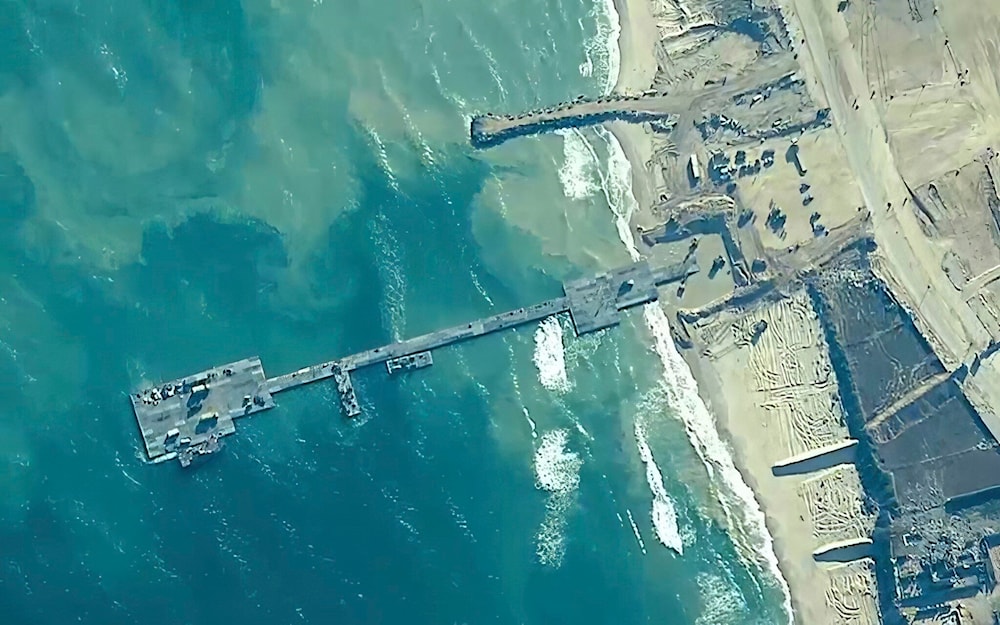Gaza pier reconnected, will resume work in upcoming days: CENTCOM
The US central command says that it will facilitate the movement of aid and food through the pier in coordination with USAID.
-

US Army soldiers, US Navy sailors and Israeli occupation forces placing the Trident Pier on the coast of Gaza Strip on Thursday, May 16, 2024 (US Central Command via AP)
The US military reconnected the offshore aid port to Gaza's coast after the $320 million infrastructure broke apart on May 25 allegedly due to bad weather, US Central Command announced Friday.
CENTCOM said in a post on X that it "successfully reestablished the temporary pier in Gaza," and "will facilitate the movement of vital food and other emergency supplies" in the upcoming days in coordination with the US Agency for International Development USAID.
Read more: PFLP warns of suspicious US plan for Gaza pier
⚡️Documentation from the connection of the pier by the US military on the shores of Gaza. pic.twitter.com/dnLpqfrrU9
— War Monitor (@WarMonitors) June 7, 2024
Vice Admiral Brad Cooper, deputy chief of USCENTCOM told reporters over the phone on Friday that the aim is to deliver via the port 450 metric tons of food and other supplies to Gaza every two days. He added that the US will resume airdropping aid soon as well.
The US floating pier in the Mediterranean Sea has faced skepticism since it was first established on May 15, questioning its efficiency in alleviating the humanitarian crisis in Israeli-besieged Gaza.
Read more: Over 1mln people in Gaza expected to face starvation by mid-July: UN
In its inaugural week of operations, only 820 tons of aid were transported through the pier, with approximately two-thirds reaching distribution points within Gaza, according to the Pentagon's figures. This falls well short of the initial target of 90 truckloads per day and accounts for just 15% of the estimated minimum daily requirement for a population of over two million people facing famine.
The United Nations Relief and Works Agency for Palestine Refugees (UNRWA) said last month that delivering aid to Gaza via land routes was irreplaceable in terms of the volume of basic assistance required.
This statement was before the Israeli occupation almost completely closed down all land routes supplying aid to the Strip, now struggling with imminent famine, after the IOF's launch of a new wide-scale aggression across Gaza, with the genocide nearing its nine-month mark.
The Karem Abu Salem and Rafah crossings have been completely shut down, affecting over 1.5 million Palestinians in northern Gaza who depend on both passageways to receive scarce aid. Concurrently, Israeli forces started an invasion of Rafah, forcibly displacing hundreds of thousands of Palestinians again to areas with very limited access to basic needs, including drinking water and food.
Permitting access of aid
The International Committee of the Red Cross (ICRC) said it is prepared to substantially boost humanitarian aid to the Gaza Strip once restrictions at vital crossing points are lifted, the head of the ICRC regional delegation for Russia and Belarus, Boris Michel, told Sputnik.
"We cannot overstate the need for sustained humanitarian relief, given the catastrophic humanitarian situation in Gaza. As soon as conditions allow, ICRC is prepared to significantly step up its assistance," Michel said on the sidelines of the St Petersburg International Economic Forum (SPIEF) in Russia.
Read more: Children under 5 in Gaza go at least 1 in 3 days without food: Reports
The ICRC official acknowledged the new phase of the Israeli siege, pointing out that it disrupted the delivery of relief aid, including essential supplies into the Strip, and held the parties "controlling" the entry point responsible for permitting the aid to cross.
"It is necessary to reinstate the steps that had been taken to increase the flow of aid, including essential humanitarian supplies into Gaza. In addition, steps need to be taken to ensure entry and exit of humanitarian personnel to Gaza, and for medical evacuations out of the Strip," he said.

 4 Min Read
4 Min Read








